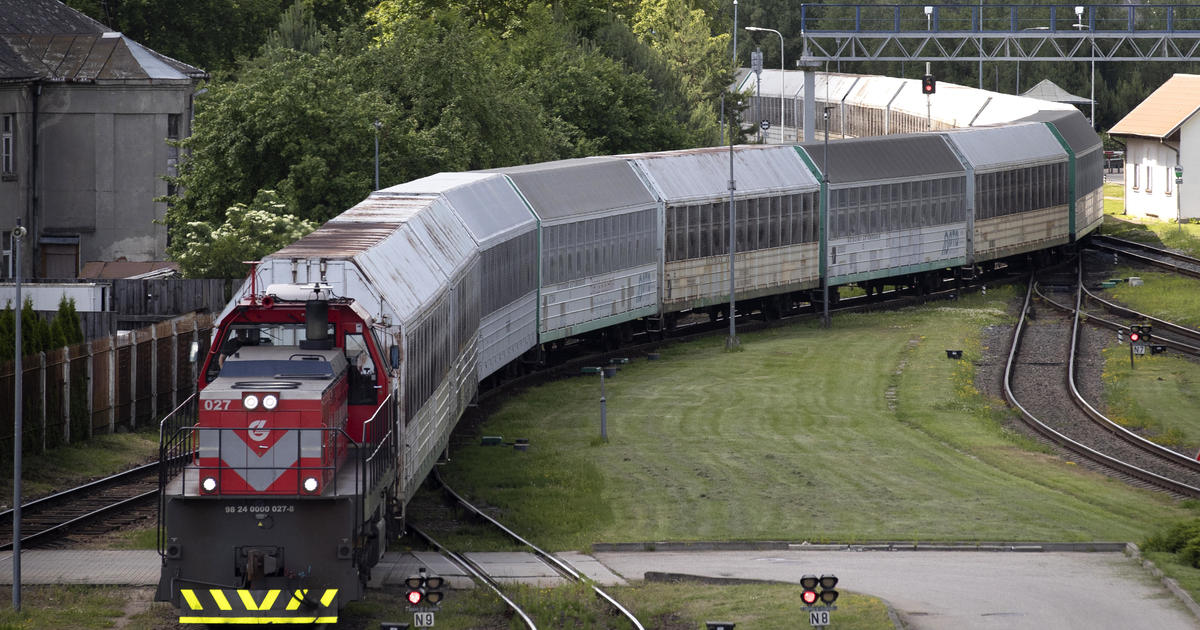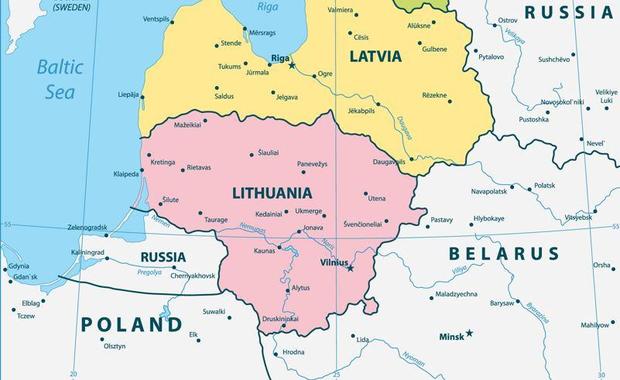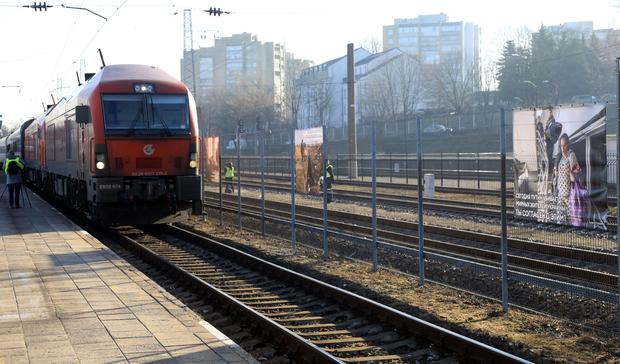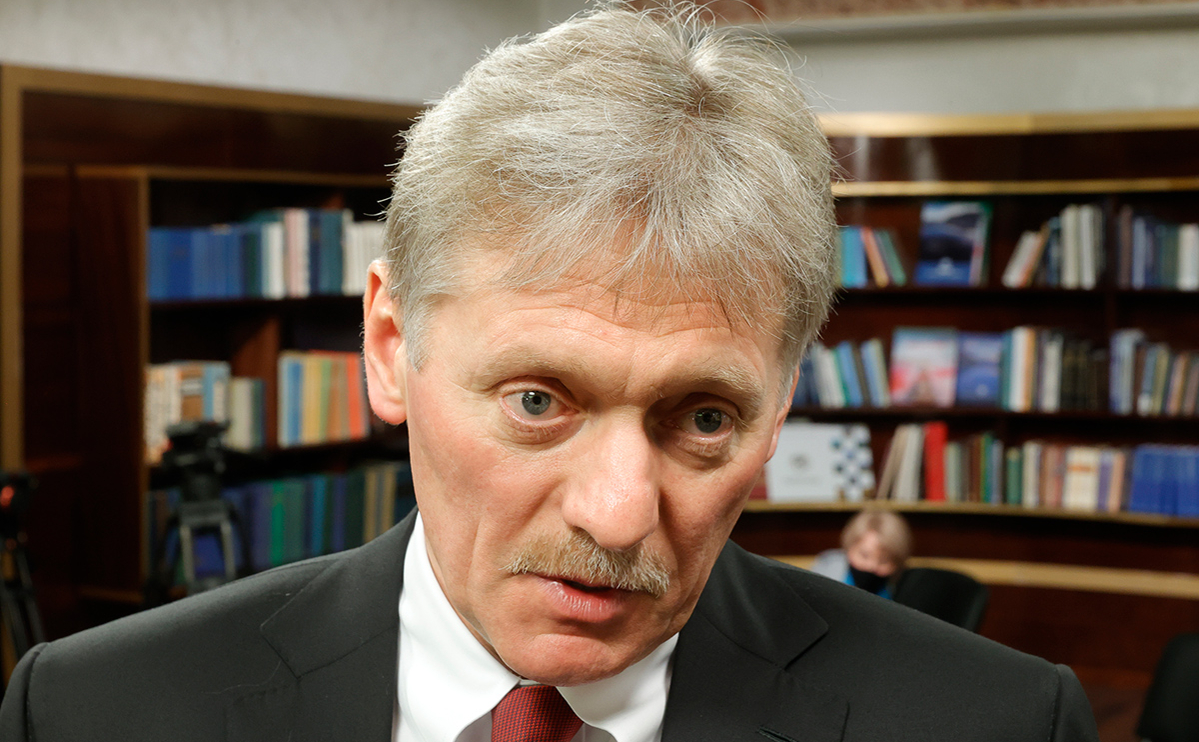
June 22, 2022 / 1:29 PM / CBS News
Lithuania’s decision to ban the transit of certain goods between Russia and its isolated exclave of Kaliningrad has provoked wrath among top officials in Moscow, and even a threat of retaliation against the European nation. Kaliningrad shares land borders with two NATO nations, Lithuania and Poland, but not Russia. Captured from Nazi Germany by the Soviet Red Army in 1945 and later ceded to the Soviet Union, the Russian territory is home to about 500,000 people.
While it is surrounded on two sides by NATO nations, it’s a strategically vital patch of ground for Moscow as it provides Russia’s only Baltic Sea coastline. It is home to the Russian military’s Baltic Fleet, and a number of advanced nuclear-capable Iskander missile installations.
But the isolated patch of ground relies on its rail connection to the rest of Russia for the majority of its civilian imports. That rail line runs through Lithuania and then neighboring Belarus, which is a Russian ally.
 A map shows Russia’s Kaliningrad Oblast, lower left, sandwiched between NATO and EU nations Poland and Lithuania. Getty/iStockphoto
A map shows Russia’s Kaliningrad Oblast, lower left, sandwiched between NATO and EU nations Poland and Lithuania. Getty/iStockphoto
On June 18, European Union member Lithuania prohibited the transit of all goods subject to EU sanctions imposed on Russia for its invasion of Ukraine via the rail link. That includes coal, metals, electronics, and construction materials.
Nikolai Patrushev, the Secretary-General of Russia’s Security Council and one of the most powerful figures in President Vladimir Putin’s inner circle, called Lithuania’s actions “hostile” and “in violation of the international law” during a visit to Kaliningrad on Tuesday.
“Russia will certainly respond to such hostile actions,” Patrushev was quoted as saying by Russian state media. “The consequences will have a serious negative impact on the population of Lithuania.”
In response, Lithuania said it was simply complying with EU decisions and stressed that the transit of passengers and non-sanctioned goods “continues uninterrupted.”
The transit of passengers and #EU non-sanctioned goods to the #Kaliningrad region through the territory of #Lithuania continues uninterrupted. 🇱🇹 has not imposed any unilateral, individual, or additional restrictions on the transit and is acting fully in accordance with EU law. pic.twitter.com/qqgr9F84XM
— Lithuania MFA | #StandWithUkraine (@LithuaniaMFA) June 20, 2022
Anton Alikhanov, the Governor of Kaliningrad, said the ban was affecting about half of all imports to the territory.
“We consider this to be a most serious violation… of the right to free transit into and out of the Kaliningrad region,” he said in a video address posted on the Telegram messaging app the day after Lithuania’s announcement.
Videos posted on social media last weekend by residents in Kalingrad appeared to show panic buying at stores.
Lithuanian authorities have mocked the complaints from Russian officials, saying no “blockade” is being imposed on Russia’s European exclave.
“It’s ironic to hear rhetoric about alleged violations of international treaties from a country which has violated possibly every single international treaty,” Lithuanian Prime Minister Ingrida Simonyte told reporters, according to the Reuters news agency.
 Photographs of Russia’s war in Ukraine are displayed as part of an exhibition at the railway station in Vilnius, Lithuania, March 25, 2022, where transit trains from Moscow to Kaliningrad make a stop over. The exhibition is intended to give transiting Russian travelers a true picture of the conflict. PETRAS MALUKAS/AFP/Getty
Photographs of Russia’s war in Ukraine are displayed as part of an exhibition at the railway station in Vilnius, Lithuania, March 25, 2022, where transit trains from Moscow to Kaliningrad make a stop over. The exhibition is intended to give transiting Russian travelers a true picture of the conflict. PETRAS MALUKAS/AFP/Getty
Western officials have been quick to point to Russia’s blockade of all ports along Ukraine’s southern Black Sea coast, which has interrupted global food supplies. The United Nations has warned that blockade could lead to a prolonged global food crisis.
EU foreign policy chief Josep Borrell cautioned Moscow against any escalation over Lithuania’s enforcement of the bloc’s sanctions.
“We are in a precautionary mood,” Borrell said Monday. “But Lithuania is not guilty. It is not implementing national [unilateral] sanctions. It is not implementing their will. Whatever they are doing has been the consequence of the previous consultation with the [European] Commission.”
With its Baltic Sea port that remains ice-free year-round, Kaliningrad had provided Russia a viable way to try and bypass the myriad international sanctions imposed against it over the Ukraine war. But the restrictions on goods moving through Lithuania will greatly limit that prospect.
 A cargo train from the Russian enclave of Kaliningrad moves to the border railway station in Kybartai, about 124 miles west of Lithuania’s capital Vilnius, June 22, 2022. Lithuania has defended its decision to bar rail transit from Russia to its Baltic Sea exclave of goods under European Union sanctions. Mindaugas Kulbis/AP
A cargo train from the Russian enclave of Kaliningrad moves to the border railway station in Kybartai, about 124 miles west of Lithuania’s capital Vilnius, June 22, 2022. Lithuania has defended its decision to bar rail transit from Russia to its Baltic Sea exclave of goods under European Union sanctions. Mindaugas Kulbis/AP
Both the Kremlin and Russia’s Foreign Ministry echoed Patrushev’s threats of “practical” retaliation against Lithuania, but Moscow hasn’t yet indicated what that will entail.
Russian lawmaker Leonid Slutsky told state news agency RIA Novosti on Wednesday that Moscow could, as a potential option, disconnect Lithuania from the regional power grid.
On Wednesday, Lithuanian President Gitanas Nauseda told Reuters that his country was ready for Russia to retaliate by severing its connection to the BRELL power grid, but he added that he did not expect a military confrontation over the transit ban.
Three decades after they severed ties with the Soviet Union, Lithuania, Latvia and Estonia still depend on Russia for much of their power supply. Last year, however, Lithuania established a way to connect to the continental European grid via Poland, lowering its dependence on Moscow.



 The Kaliningrad garrison serves as an intimidating Russian presence in the Baltic region. The Baltic Fleet, headquartered there, has been significantly upgraded in recent years with new ships, ground forces and missiles.
The Kaliningrad garrison serves as an intimidating Russian presence in the Baltic region. The Baltic Fleet, headquartered there, has been significantly upgraded in recent years with new ships, ground forces and missiles. 





